Management | Global Business Environment
VerifiedAdded on 2022/08/25
|8
|2100
|21
AI Summary
Contribute Materials
Your contribution can guide someone’s learning journey. Share your
documents today.
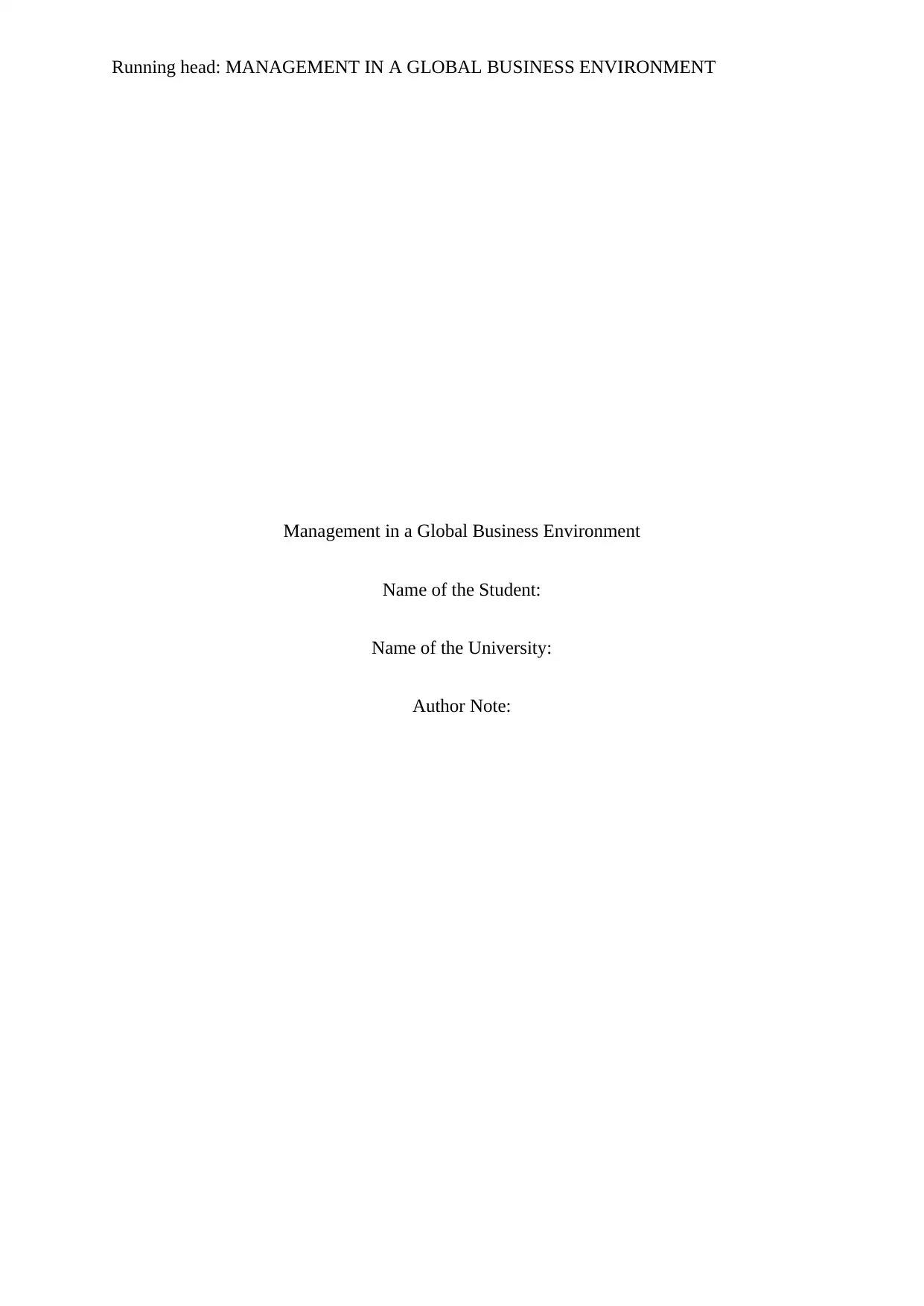
Running head: MANAGEMENT IN A GLOBAL BUSINESS ENVIRONMENT
Management in a Global Business Environment
Name of the Student:
Name of the University:
Author Note:
Management in a Global Business Environment
Name of the Student:
Name of the University:
Author Note:
Secure Best Marks with AI Grader
Need help grading? Try our AI Grader for instant feedback on your assignments.
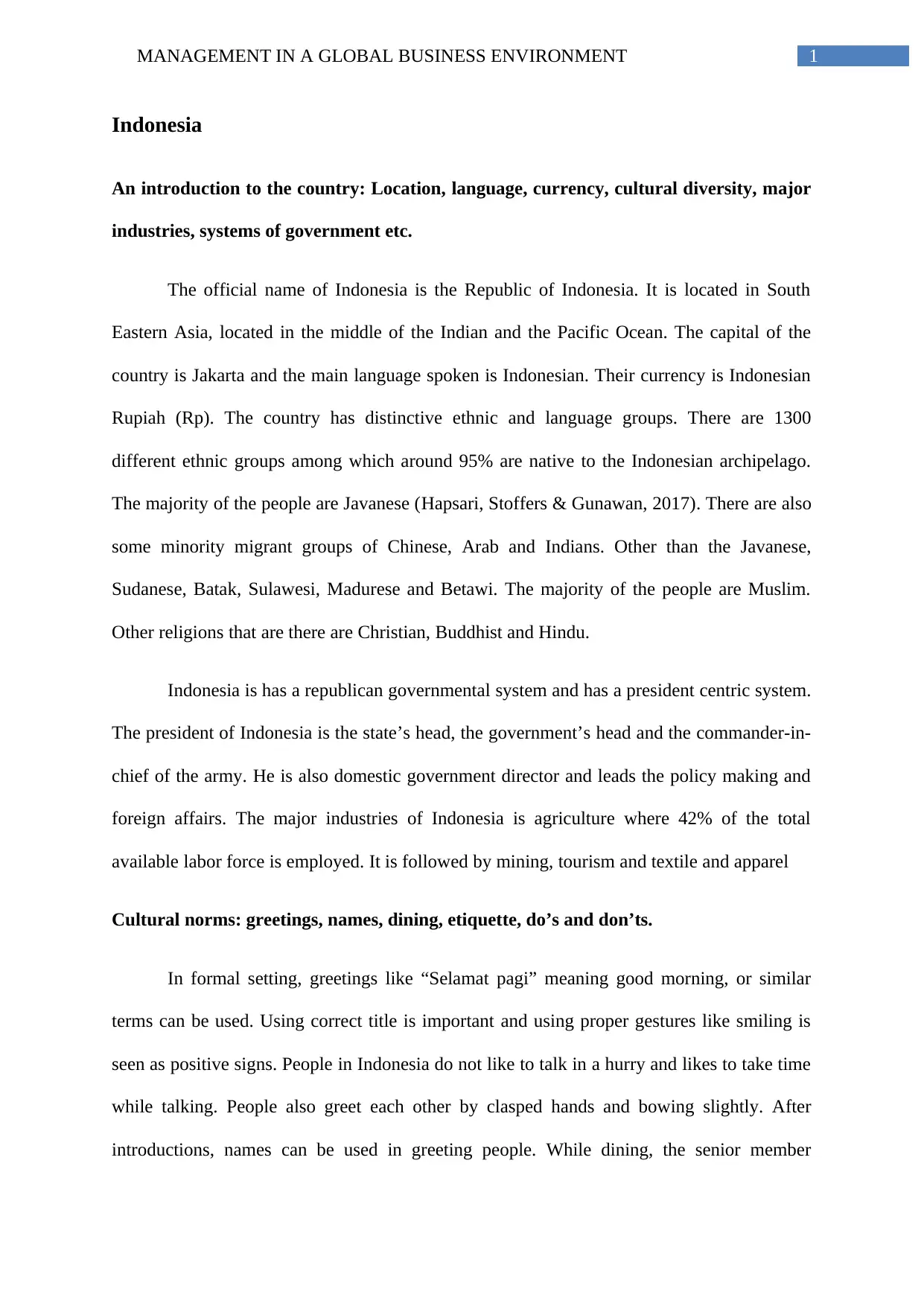
1MANAGEMENT IN A GLOBAL BUSINESS ENVIRONMENT
Indonesia
An introduction to the country: Location, language, currency, cultural diversity, major
industries, systems of government etc.
The official name of Indonesia is the Republic of Indonesia. It is located in South
Eastern Asia, located in the middle of the Indian and the Pacific Ocean. The capital of the
country is Jakarta and the main language spoken is Indonesian. Their currency is Indonesian
Rupiah (Rp). The country has distinctive ethnic and language groups. There are 1300
different ethnic groups among which around 95% are native to the Indonesian archipelago.
The majority of the people are Javanese (Hapsari, Stoffers & Gunawan, 2017). There are also
some minority migrant groups of Chinese, Arab and Indians. Other than the Javanese,
Sudanese, Batak, Sulawesi, Madurese and Betawi. The majority of the people are Muslim.
Other religions that are there are Christian, Buddhist and Hindu.
Indonesia is has a republican governmental system and has a president centric system.
The president of Indonesia is the state’s head, the government’s head and the commander-in-
chief of the army. He is also domestic government director and leads the policy making and
foreign affairs. The major industries of Indonesia is agriculture where 42% of the total
available labor force is employed. It is followed by mining, tourism and textile and apparel
Cultural norms: greetings, names, dining, etiquette, do’s and don’ts.
In formal setting, greetings like “Selamat pagi” meaning good morning, or similar
terms can be used. Using correct title is important and using proper gestures like smiling is
seen as positive signs. People in Indonesia do not like to talk in a hurry and likes to take time
while talking. People also greet each other by clasped hands and bowing slightly. After
introductions, names can be used in greeting people. While dining, the senior member
Indonesia
An introduction to the country: Location, language, currency, cultural diversity, major
industries, systems of government etc.
The official name of Indonesia is the Republic of Indonesia. It is located in South
Eastern Asia, located in the middle of the Indian and the Pacific Ocean. The capital of the
country is Jakarta and the main language spoken is Indonesian. Their currency is Indonesian
Rupiah (Rp). The country has distinctive ethnic and language groups. There are 1300
different ethnic groups among which around 95% are native to the Indonesian archipelago.
The majority of the people are Javanese (Hapsari, Stoffers & Gunawan, 2017). There are also
some minority migrant groups of Chinese, Arab and Indians. Other than the Javanese,
Sudanese, Batak, Sulawesi, Madurese and Betawi. The majority of the people are Muslim.
Other religions that are there are Christian, Buddhist and Hindu.
Indonesia is has a republican governmental system and has a president centric system.
The president of Indonesia is the state’s head, the government’s head and the commander-in-
chief of the army. He is also domestic government director and leads the policy making and
foreign affairs. The major industries of Indonesia is agriculture where 42% of the total
available labor force is employed. It is followed by mining, tourism and textile and apparel
Cultural norms: greetings, names, dining, etiquette, do’s and don’ts.
In formal setting, greetings like “Selamat pagi” meaning good morning, or similar
terms can be used. Using correct title is important and using proper gestures like smiling is
seen as positive signs. People in Indonesia do not like to talk in a hurry and likes to take time
while talking. People also greet each other by clasped hands and bowing slightly. After
introductions, names can be used in greeting people. While dining, the senior member
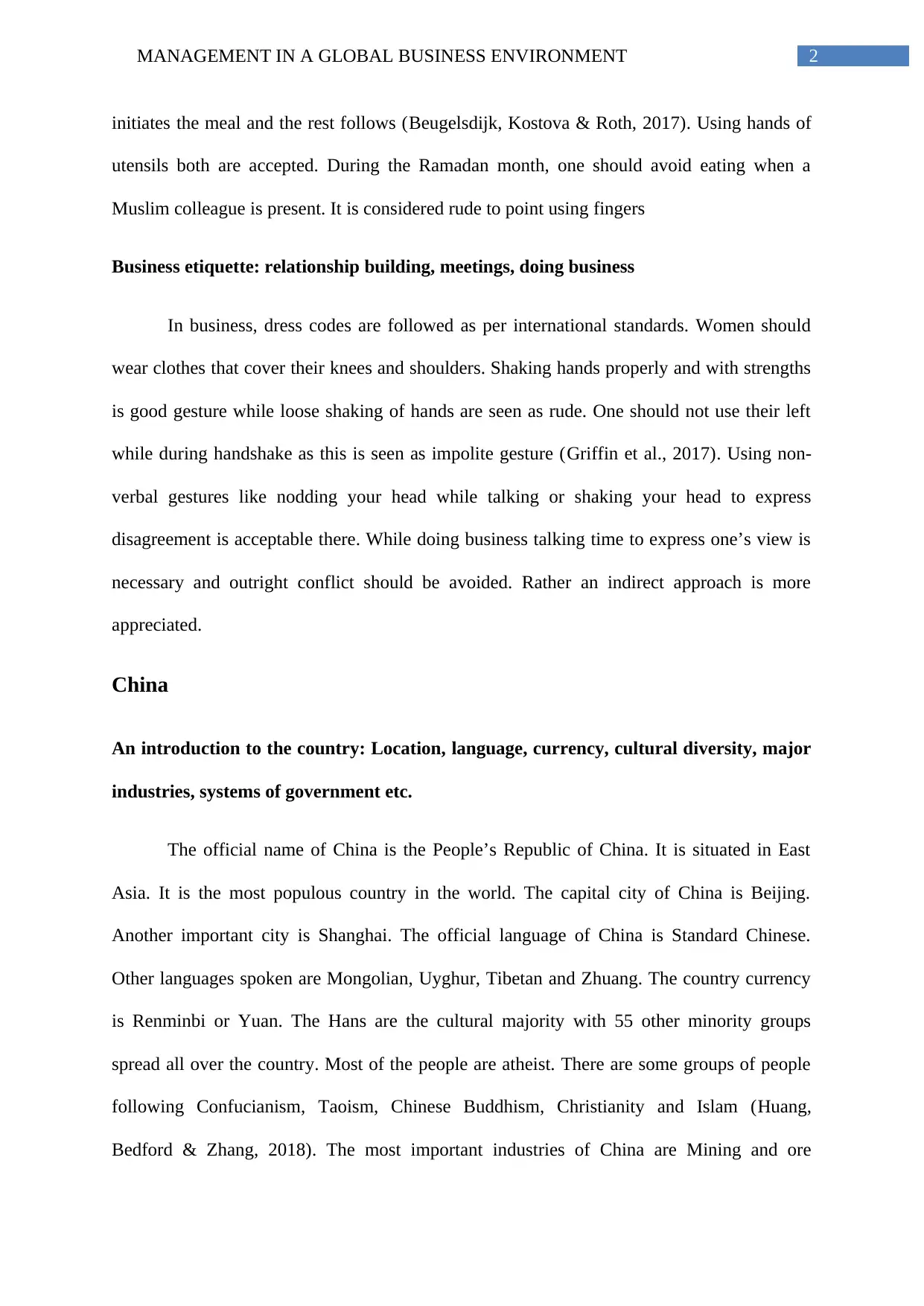
2MANAGEMENT IN A GLOBAL BUSINESS ENVIRONMENT
initiates the meal and the rest follows (Beugelsdijk, Kostova & Roth, 2017). Using hands of
utensils both are accepted. During the Ramadan month, one should avoid eating when a
Muslim colleague is present. It is considered rude to point using fingers
Business etiquette: relationship building, meetings, doing business
In business, dress codes are followed as per international standards. Women should
wear clothes that cover their knees and shoulders. Shaking hands properly and with strengths
is good gesture while loose shaking of hands are seen as rude. One should not use their left
while during handshake as this is seen as impolite gesture (Griffin et al., 2017). Using non-
verbal gestures like nodding your head while talking or shaking your head to express
disagreement is acceptable there. While doing business talking time to express one’s view is
necessary and outright conflict should be avoided. Rather an indirect approach is more
appreciated.
China
An introduction to the country: Location, language, currency, cultural diversity, major
industries, systems of government etc.
The official name of China is the People’s Republic of China. It is situated in East
Asia. It is the most populous country in the world. The capital city of China is Beijing.
Another important city is Shanghai. The official language of China is Standard Chinese.
Other languages spoken are Mongolian, Uyghur, Tibetan and Zhuang. The country currency
is Renminbi or Yuan. The Hans are the cultural majority with 55 other minority groups
spread all over the country. Most of the people are atheist. There are some groups of people
following Confucianism, Taoism, Chinese Buddhism, Christianity and Islam (Huang,
Bedford & Zhang, 2018). The most important industries of China are Mining and ore
initiates the meal and the rest follows (Beugelsdijk, Kostova & Roth, 2017). Using hands of
utensils both are accepted. During the Ramadan month, one should avoid eating when a
Muslim colleague is present. It is considered rude to point using fingers
Business etiquette: relationship building, meetings, doing business
In business, dress codes are followed as per international standards. Women should
wear clothes that cover their knees and shoulders. Shaking hands properly and with strengths
is good gesture while loose shaking of hands are seen as rude. One should not use their left
while during handshake as this is seen as impolite gesture (Griffin et al., 2017). Using non-
verbal gestures like nodding your head while talking or shaking your head to express
disagreement is acceptable there. While doing business talking time to express one’s view is
necessary and outright conflict should be avoided. Rather an indirect approach is more
appreciated.
China
An introduction to the country: Location, language, currency, cultural diversity, major
industries, systems of government etc.
The official name of China is the People’s Republic of China. It is situated in East
Asia. It is the most populous country in the world. The capital city of China is Beijing.
Another important city is Shanghai. The official language of China is Standard Chinese.
Other languages spoken are Mongolian, Uyghur, Tibetan and Zhuang. The country currency
is Renminbi or Yuan. The Hans are the cultural majority with 55 other minority groups
spread all over the country. Most of the people are atheist. There are some groups of people
following Confucianism, Taoism, Chinese Buddhism, Christianity and Islam (Huang,
Bedford & Zhang, 2018). The most important industries of China are Mining and ore
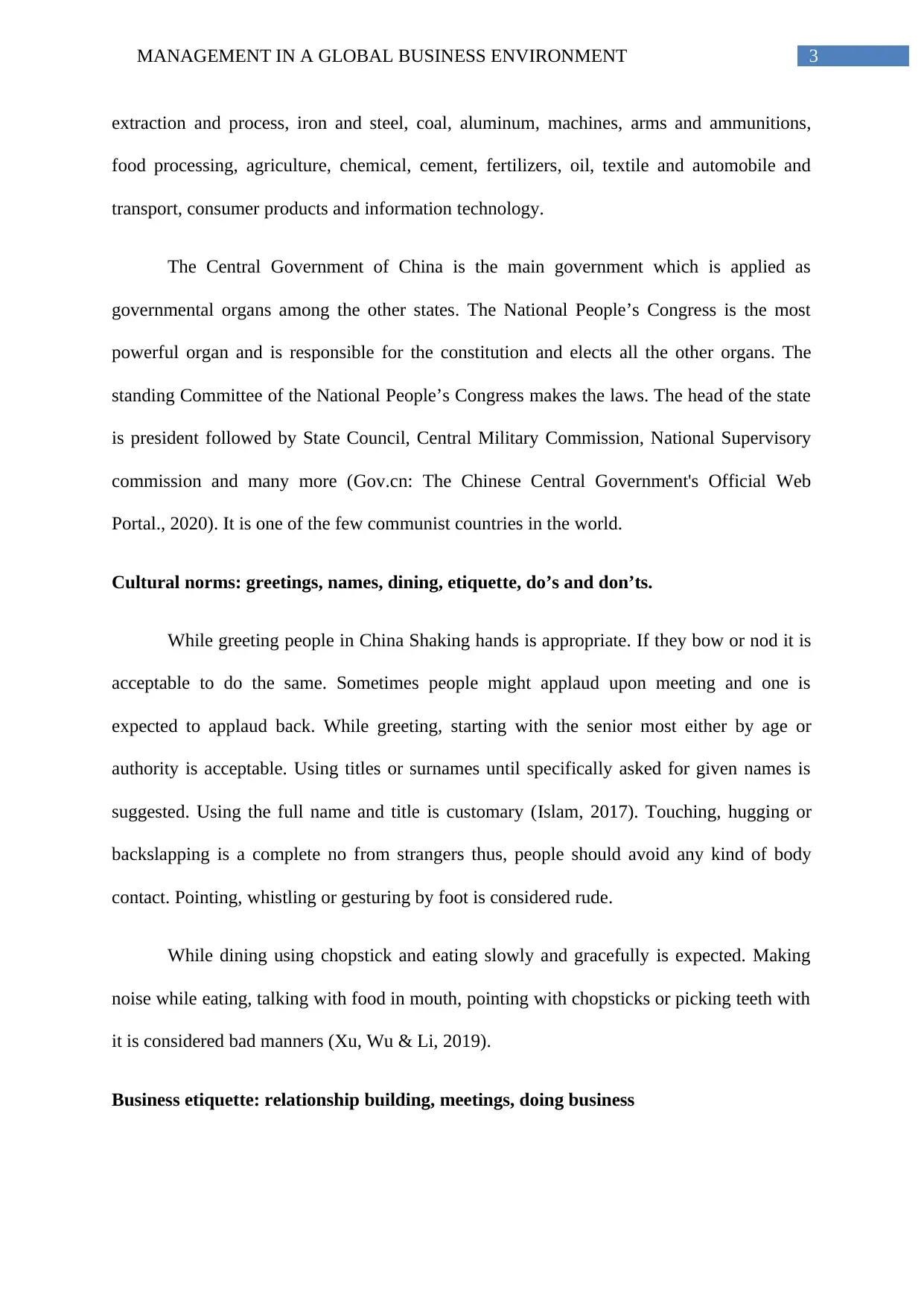
3MANAGEMENT IN A GLOBAL BUSINESS ENVIRONMENT
extraction and process, iron and steel, coal, aluminum, machines, arms and ammunitions,
food processing, agriculture, chemical, cement, fertilizers, oil, textile and automobile and
transport, consumer products and information technology.
The Central Government of China is the main government which is applied as
governmental organs among the other states. The National People’s Congress is the most
powerful organ and is responsible for the constitution and elects all the other organs. The
standing Committee of the National People’s Congress makes the laws. The head of the state
is president followed by State Council, Central Military Commission, National Supervisory
commission and many more (Gov.cn: The Chinese Central Government's Official Web
Portal., 2020). It is one of the few communist countries in the world.
Cultural norms: greetings, names, dining, etiquette, do’s and don’ts.
While greeting people in China Shaking hands is appropriate. If they bow or nod it is
acceptable to do the same. Sometimes people might applaud upon meeting and one is
expected to applaud back. While greeting, starting with the senior most either by age or
authority is acceptable. Using titles or surnames until specifically asked for given names is
suggested. Using the full name and title is customary (Islam, 2017). Touching, hugging or
backslapping is a complete no from strangers thus, people should avoid any kind of body
contact. Pointing, whistling or gesturing by foot is considered rude.
While dining using chopstick and eating slowly and gracefully is expected. Making
noise while eating, talking with food in mouth, pointing with chopsticks or picking teeth with
it is considered bad manners (Xu, Wu & Li, 2019).
Business etiquette: relationship building, meetings, doing business
extraction and process, iron and steel, coal, aluminum, machines, arms and ammunitions,
food processing, agriculture, chemical, cement, fertilizers, oil, textile and automobile and
transport, consumer products and information technology.
The Central Government of China is the main government which is applied as
governmental organs among the other states. The National People’s Congress is the most
powerful organ and is responsible for the constitution and elects all the other organs. The
standing Committee of the National People’s Congress makes the laws. The head of the state
is president followed by State Council, Central Military Commission, National Supervisory
commission and many more (Gov.cn: The Chinese Central Government's Official Web
Portal., 2020). It is one of the few communist countries in the world.
Cultural norms: greetings, names, dining, etiquette, do’s and don’ts.
While greeting people in China Shaking hands is appropriate. If they bow or nod it is
acceptable to do the same. Sometimes people might applaud upon meeting and one is
expected to applaud back. While greeting, starting with the senior most either by age or
authority is acceptable. Using titles or surnames until specifically asked for given names is
suggested. Using the full name and title is customary (Islam, 2017). Touching, hugging or
backslapping is a complete no from strangers thus, people should avoid any kind of body
contact. Pointing, whistling or gesturing by foot is considered rude.
While dining using chopstick and eating slowly and gracefully is expected. Making
noise while eating, talking with food in mouth, pointing with chopsticks or picking teeth with
it is considered bad manners (Xu, Wu & Li, 2019).
Business etiquette: relationship building, meetings, doing business
Secure Best Marks with AI Grader
Need help grading? Try our AI Grader for instant feedback on your assignments.
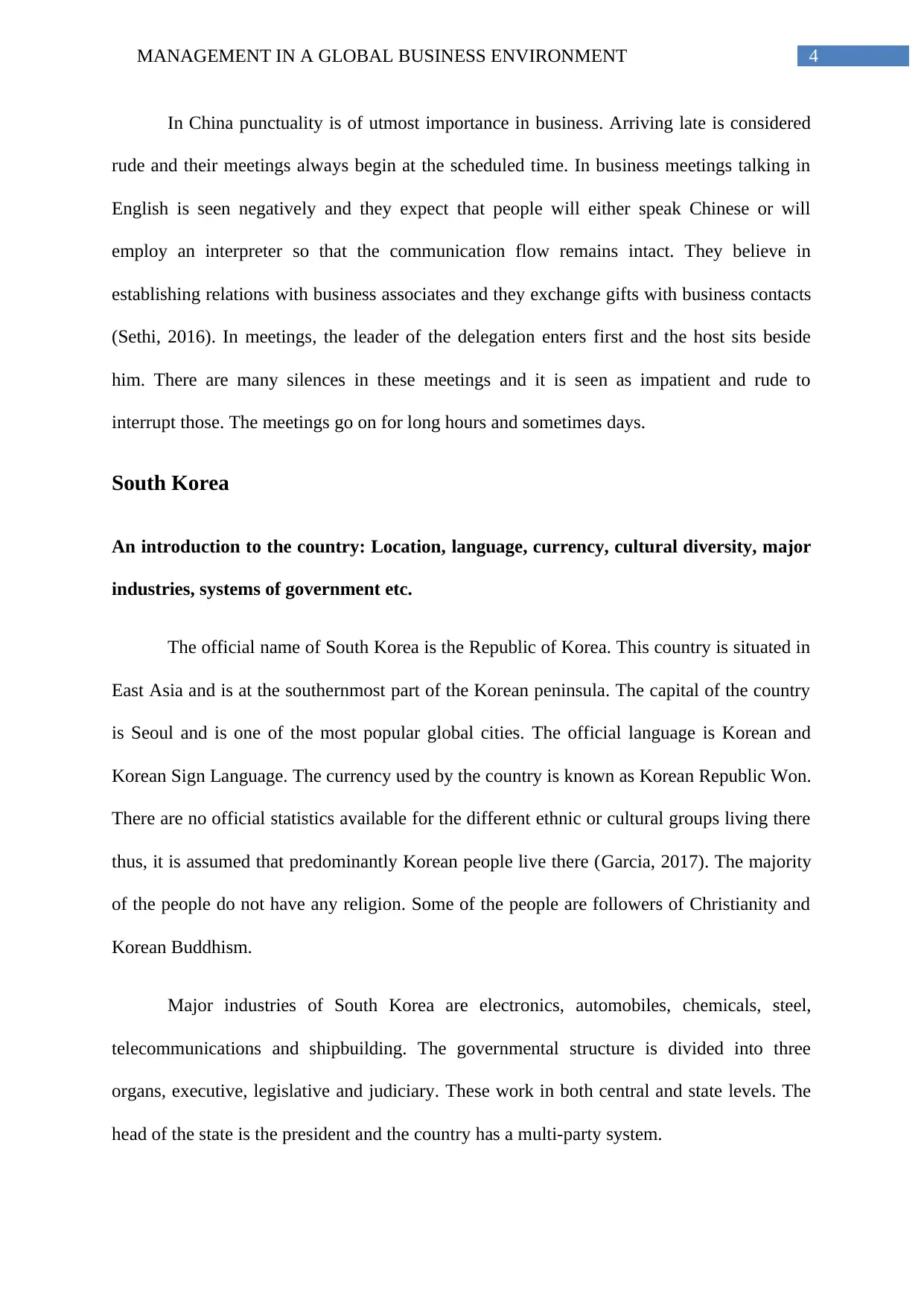
4MANAGEMENT IN A GLOBAL BUSINESS ENVIRONMENT
In China punctuality is of utmost importance in business. Arriving late is considered
rude and their meetings always begin at the scheduled time. In business meetings talking in
English is seen negatively and they expect that people will either speak Chinese or will
employ an interpreter so that the communication flow remains intact. They believe in
establishing relations with business associates and they exchange gifts with business contacts
(Sethi, 2016). In meetings, the leader of the delegation enters first and the host sits beside
him. There are many silences in these meetings and it is seen as impatient and rude to
interrupt those. The meetings go on for long hours and sometimes days.
South Korea
An introduction to the country: Location, language, currency, cultural diversity, major
industries, systems of government etc.
The official name of South Korea is the Republic of Korea. This country is situated in
East Asia and is at the southernmost part of the Korean peninsula. The capital of the country
is Seoul and is one of the most popular global cities. The official language is Korean and
Korean Sign Language. The currency used by the country is known as Korean Republic Won.
There are no official statistics available for the different ethnic or cultural groups living there
thus, it is assumed that predominantly Korean people live there (Garcia, 2017). The majority
of the people do not have any religion. Some of the people are followers of Christianity and
Korean Buddhism.
Major industries of South Korea are electronics, automobiles, chemicals, steel,
telecommunications and shipbuilding. The governmental structure is divided into three
organs, executive, legislative and judiciary. These work in both central and state levels. The
head of the state is the president and the country has a multi-party system.
In China punctuality is of utmost importance in business. Arriving late is considered
rude and their meetings always begin at the scheduled time. In business meetings talking in
English is seen negatively and they expect that people will either speak Chinese or will
employ an interpreter so that the communication flow remains intact. They believe in
establishing relations with business associates and they exchange gifts with business contacts
(Sethi, 2016). In meetings, the leader of the delegation enters first and the host sits beside
him. There are many silences in these meetings and it is seen as impatient and rude to
interrupt those. The meetings go on for long hours and sometimes days.
South Korea
An introduction to the country: Location, language, currency, cultural diversity, major
industries, systems of government etc.
The official name of South Korea is the Republic of Korea. This country is situated in
East Asia and is at the southernmost part of the Korean peninsula. The capital of the country
is Seoul and is one of the most popular global cities. The official language is Korean and
Korean Sign Language. The currency used by the country is known as Korean Republic Won.
There are no official statistics available for the different ethnic or cultural groups living there
thus, it is assumed that predominantly Korean people live there (Garcia, 2017). The majority
of the people do not have any religion. Some of the people are followers of Christianity and
Korean Buddhism.
Major industries of South Korea are electronics, automobiles, chemicals, steel,
telecommunications and shipbuilding. The governmental structure is divided into three
organs, executive, legislative and judiciary. These work in both central and state levels. The
head of the state is the president and the country has a multi-party system.
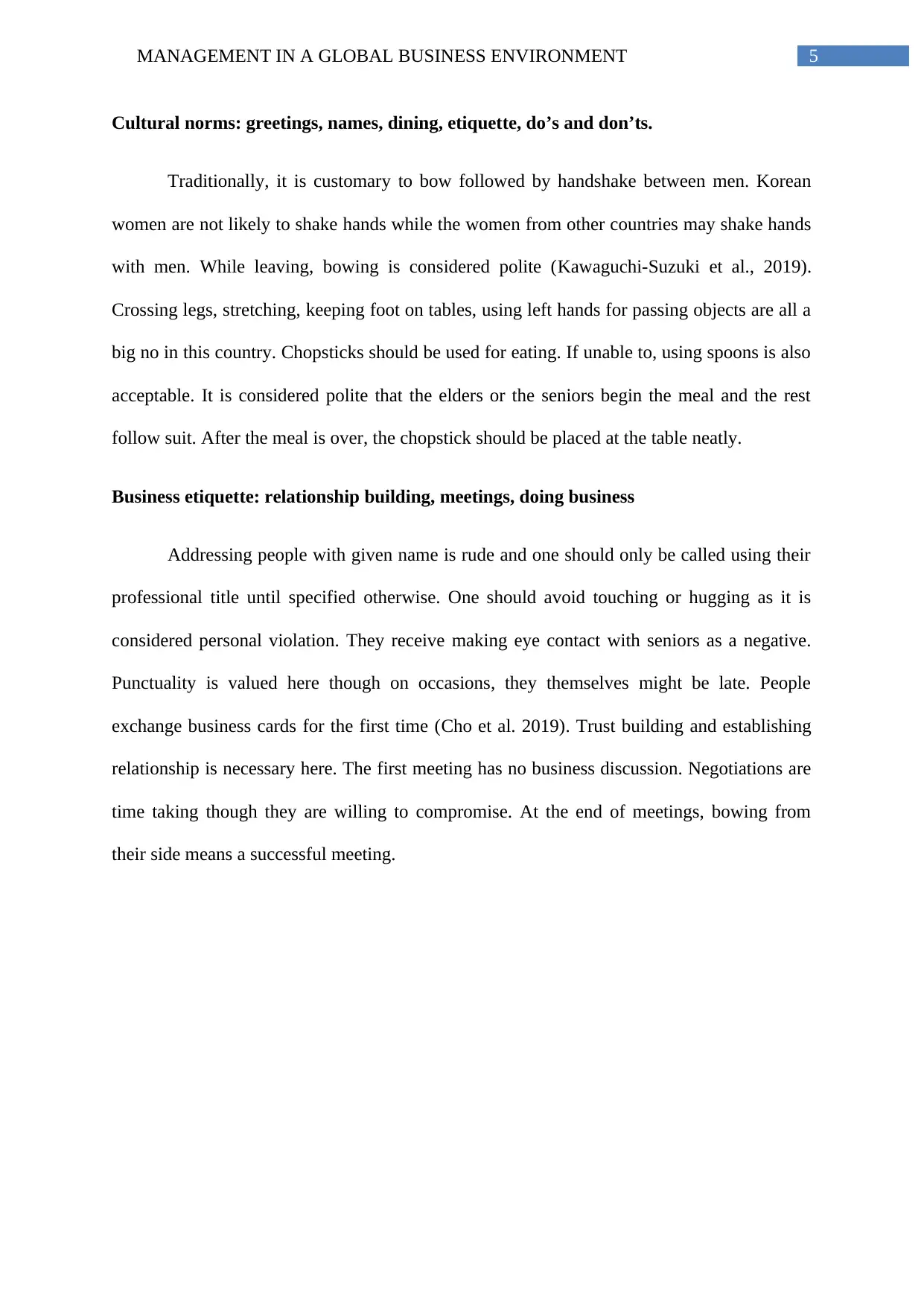
5MANAGEMENT IN A GLOBAL BUSINESS ENVIRONMENT
Cultural norms: greetings, names, dining, etiquette, do’s and don’ts.
Traditionally, it is customary to bow followed by handshake between men. Korean
women are not likely to shake hands while the women from other countries may shake hands
with men. While leaving, bowing is considered polite (Kawaguchi-Suzuki et al., 2019).
Crossing legs, stretching, keeping foot on tables, using left hands for passing objects are all a
big no in this country. Chopsticks should be used for eating. If unable to, using spoons is also
acceptable. It is considered polite that the elders or the seniors begin the meal and the rest
follow suit. After the meal is over, the chopstick should be placed at the table neatly.
Business etiquette: relationship building, meetings, doing business
Addressing people with given name is rude and one should only be called using their
professional title until specified otherwise. One should avoid touching or hugging as it is
considered personal violation. They receive making eye contact with seniors as a negative.
Punctuality is valued here though on occasions, they themselves might be late. People
exchange business cards for the first time (Cho et al. 2019). Trust building and establishing
relationship is necessary here. The first meeting has no business discussion. Negotiations are
time taking though they are willing to compromise. At the end of meetings, bowing from
their side means a successful meeting.
Cultural norms: greetings, names, dining, etiquette, do’s and don’ts.
Traditionally, it is customary to bow followed by handshake between men. Korean
women are not likely to shake hands while the women from other countries may shake hands
with men. While leaving, bowing is considered polite (Kawaguchi-Suzuki et al., 2019).
Crossing legs, stretching, keeping foot on tables, using left hands for passing objects are all a
big no in this country. Chopsticks should be used for eating. If unable to, using spoons is also
acceptable. It is considered polite that the elders or the seniors begin the meal and the rest
follow suit. After the meal is over, the chopstick should be placed at the table neatly.
Business etiquette: relationship building, meetings, doing business
Addressing people with given name is rude and one should only be called using their
professional title until specified otherwise. One should avoid touching or hugging as it is
considered personal violation. They receive making eye contact with seniors as a negative.
Punctuality is valued here though on occasions, they themselves might be late. People
exchange business cards for the first time (Cho et al. 2019). Trust building and establishing
relationship is necessary here. The first meeting has no business discussion. Negotiations are
time taking though they are willing to compromise. At the end of meetings, bowing from
their side means a successful meeting.
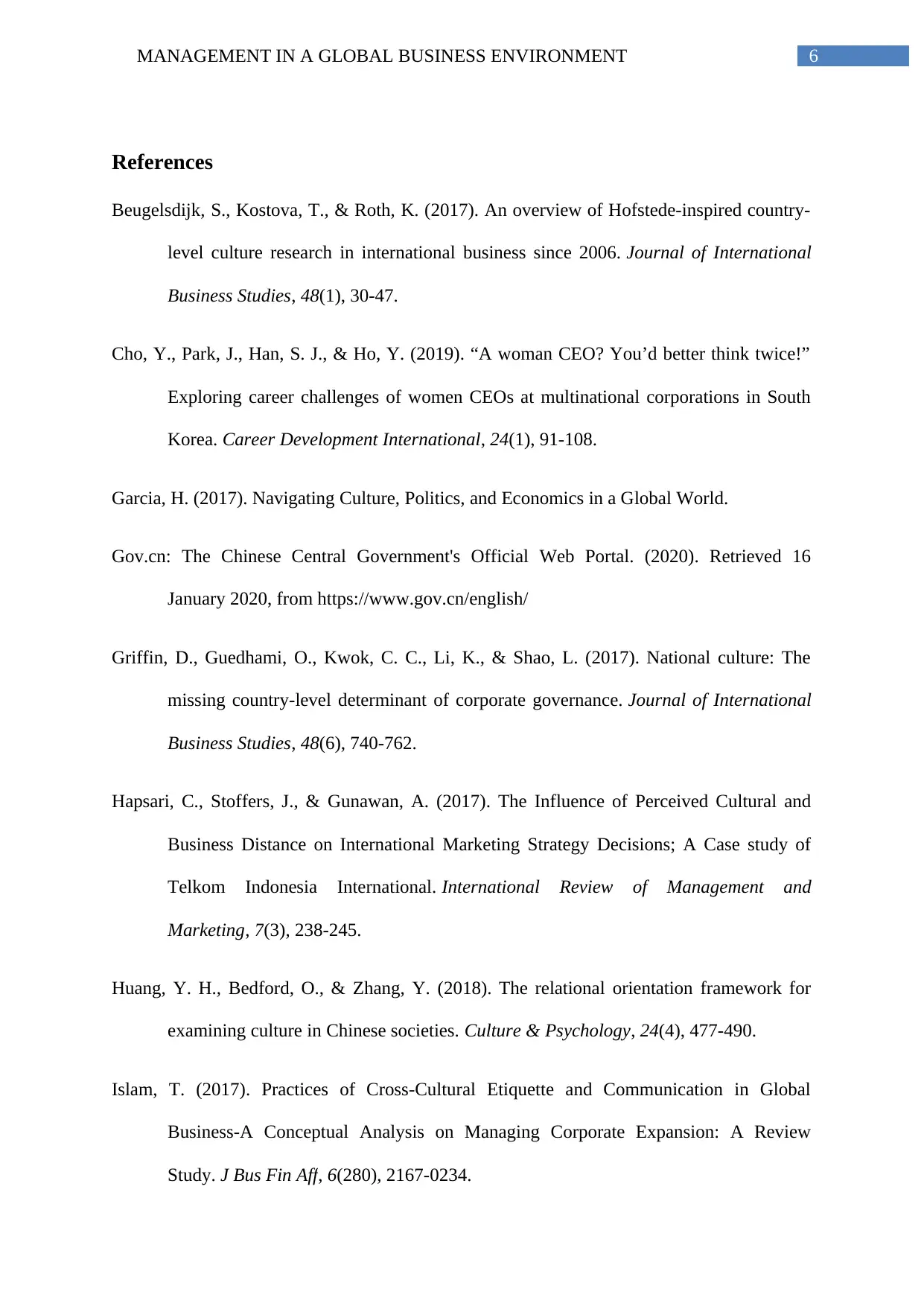
6MANAGEMENT IN A GLOBAL BUSINESS ENVIRONMENT
References
Beugelsdijk, S., Kostova, T., & Roth, K. (2017). An overview of Hofstede-inspired country-
level culture research in international business since 2006. Journal of International
Business Studies, 48(1), 30-47.
Cho, Y., Park, J., Han, S. J., & Ho, Y. (2019). “A woman CEO? You’d better think twice!”
Exploring career challenges of women CEOs at multinational corporations in South
Korea. Career Development International, 24(1), 91-108.
Garcia, H. (2017). Navigating Culture, Politics, and Economics in a Global World.
Gov.cn: The Chinese Central Government's Official Web Portal. (2020). Retrieved 16
January 2020, from https://www.gov.cn/english/
Griffin, D., Guedhami, O., Kwok, C. C., Li, K., & Shao, L. (2017). National culture: The
missing country-level determinant of corporate governance. Journal of International
Business Studies, 48(6), 740-762.
Hapsari, C., Stoffers, J., & Gunawan, A. (2017). The Influence of Perceived Cultural and
Business Distance on International Marketing Strategy Decisions; A Case study of
Telkom Indonesia International. International Review of Management and
Marketing, 7(3), 238-245.
Huang, Y. H., Bedford, O., & Zhang, Y. (2018). The relational orientation framework for
examining culture in Chinese societies. Culture & Psychology, 24(4), 477-490.
Islam, T. (2017). Practices of Cross-Cultural Etiquette and Communication in Global
Business-A Conceptual Analysis on Managing Corporate Expansion: A Review
Study. J Bus Fin Aff, 6(280), 2167-0234.
References
Beugelsdijk, S., Kostova, T., & Roth, K. (2017). An overview of Hofstede-inspired country-
level culture research in international business since 2006. Journal of International
Business Studies, 48(1), 30-47.
Cho, Y., Park, J., Han, S. J., & Ho, Y. (2019). “A woman CEO? You’d better think twice!”
Exploring career challenges of women CEOs at multinational corporations in South
Korea. Career Development International, 24(1), 91-108.
Garcia, H. (2017). Navigating Culture, Politics, and Economics in a Global World.
Gov.cn: The Chinese Central Government's Official Web Portal. (2020). Retrieved 16
January 2020, from https://www.gov.cn/english/
Griffin, D., Guedhami, O., Kwok, C. C., Li, K., & Shao, L. (2017). National culture: The
missing country-level determinant of corporate governance. Journal of International
Business Studies, 48(6), 740-762.
Hapsari, C., Stoffers, J., & Gunawan, A. (2017). The Influence of Perceived Cultural and
Business Distance on International Marketing Strategy Decisions; A Case study of
Telkom Indonesia International. International Review of Management and
Marketing, 7(3), 238-245.
Huang, Y. H., Bedford, O., & Zhang, Y. (2018). The relational orientation framework for
examining culture in Chinese societies. Culture & Psychology, 24(4), 477-490.
Islam, T. (2017). Practices of Cross-Cultural Etiquette and Communication in Global
Business-A Conceptual Analysis on Managing Corporate Expansion: A Review
Study. J Bus Fin Aff, 6(280), 2167-0234.
Paraphrase This Document
Need a fresh take? Get an instant paraphrase of this document with our AI Paraphraser
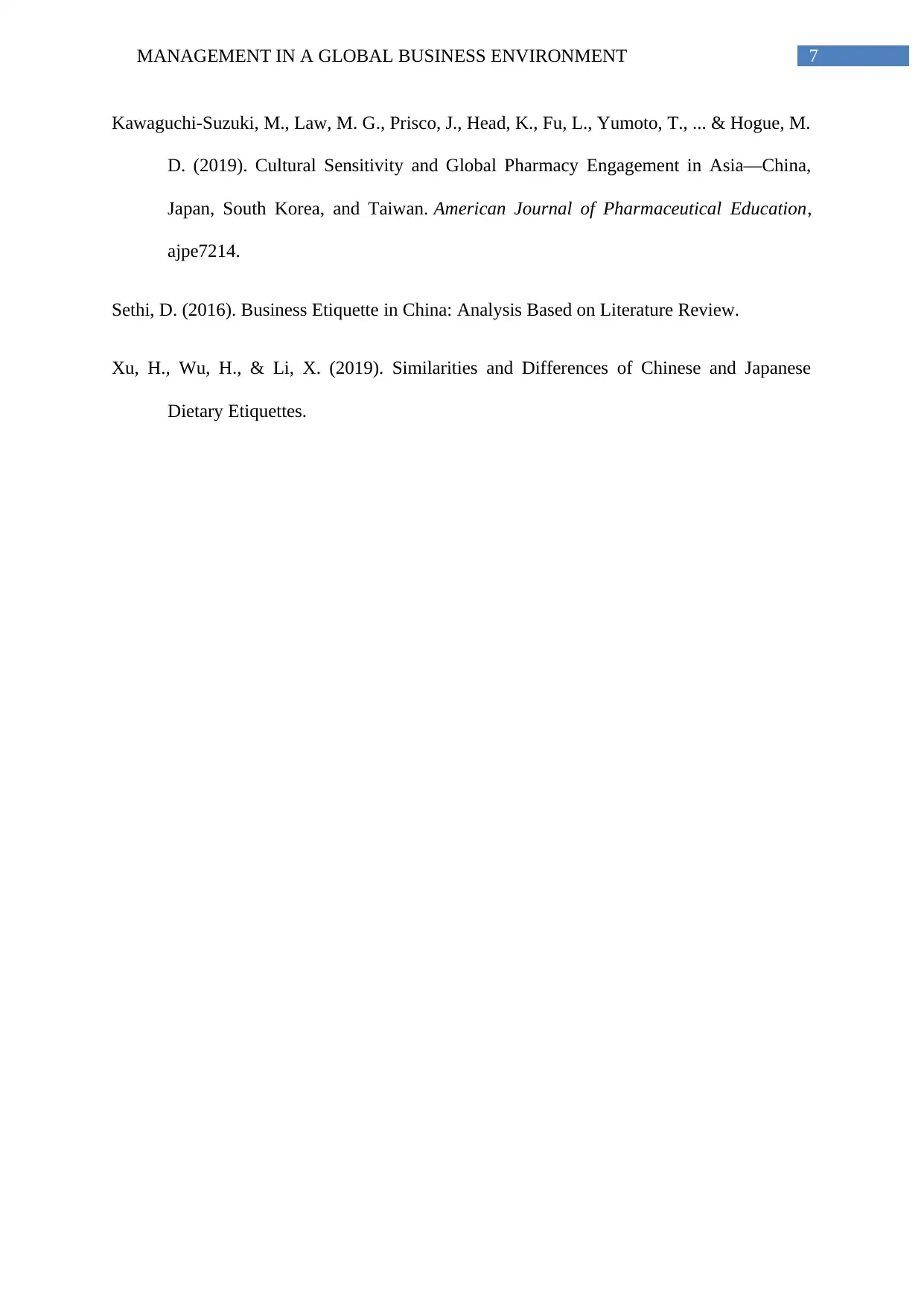
7MANAGEMENT IN A GLOBAL BUSINESS ENVIRONMENT
Kawaguchi-Suzuki, M., Law, M. G., Prisco, J., Head, K., Fu, L., Yumoto, T., ... & Hogue, M.
D. (2019). Cultural Sensitivity and Global Pharmacy Engagement in Asia—China,
Japan, South Korea, and Taiwan. American Journal of Pharmaceutical Education,
ajpe7214.
Sethi, D. (2016). Business Etiquette in China: Analysis Based on Literature Review.
Xu, H., Wu, H., & Li, X. (2019). Similarities and Differences of Chinese and Japanese
Dietary Etiquettes.
Kawaguchi-Suzuki, M., Law, M. G., Prisco, J., Head, K., Fu, L., Yumoto, T., ... & Hogue, M.
D. (2019). Cultural Sensitivity and Global Pharmacy Engagement in Asia—China,
Japan, South Korea, and Taiwan. American Journal of Pharmaceutical Education,
ajpe7214.
Sethi, D. (2016). Business Etiquette in China: Analysis Based on Literature Review.
Xu, H., Wu, H., & Li, X. (2019). Similarities and Differences of Chinese and Japanese
Dietary Etiquettes.
1 out of 8
Your All-in-One AI-Powered Toolkit for Academic Success.
+13062052269
info@desklib.com
Available 24*7 on WhatsApp / Email
![[object Object]](/_next/static/media/star-bottom.7253800d.svg)
Unlock your academic potential
© 2024 | Zucol Services PVT LTD | All rights reserved.

